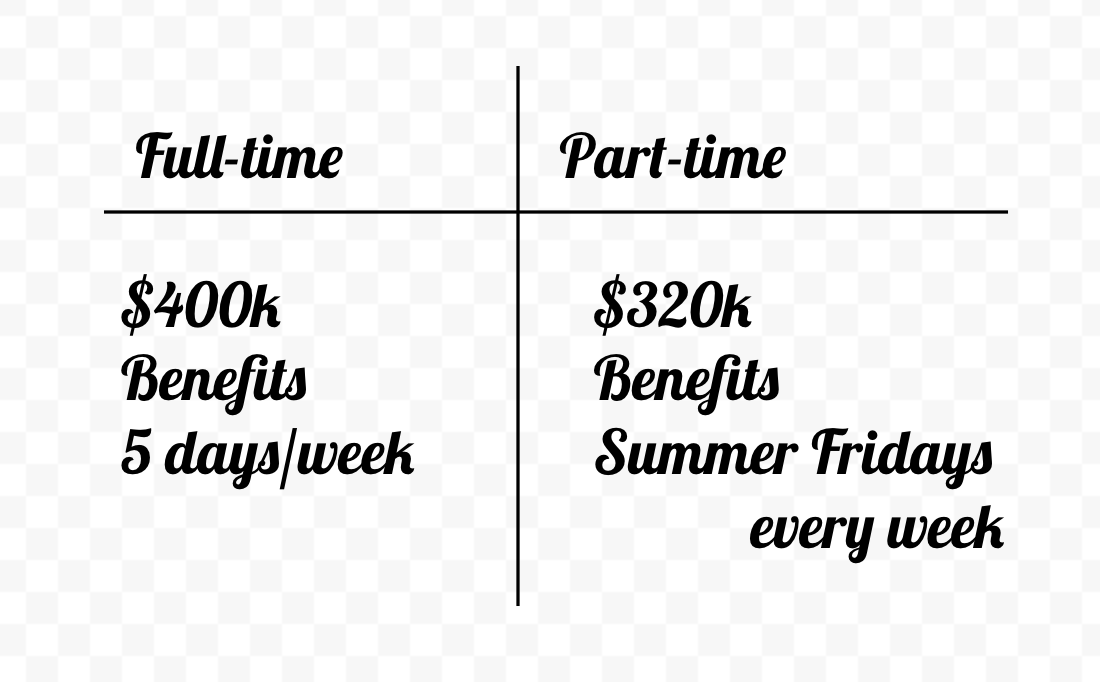The future of work isn't just remote, it's part-time
You may not need 40 hours per week to build a successful career and balanced life
Note: This post hit the front page of Hacker News and generated some good discussion. Check it out here.
Tell me if you’ve heard this story before: “software engineering manager leaves cushy high paying remote job with great work-life balance in the midst of a global pandemic #thegreatresignation”. Yep, this was me.
Despite the new wave of remote work, many tech employees have quit their jobs and gone soul searching. Often you hear what people have run away from, but not what they’re running to. Personally, I’ve started volunteering, a family farm, a substack ($0 YTD and 0 subscribers as of this post) while continuing to earn income through two different consulting gigs. I’ve had more time to spend with my family, take care of life’s errands, sleep more, and care more for those around me. The ability to make meaningful income part-time has afforded me the opportunity to spend my time in a way unimaginable before.
My story isn’t that unique. While there is a lot of talk (rightfully so) about the future of work being remote, I believe I’m part of another big wave that’s coming in tech: part-time work.
What is part-time work?
The most obvious definition is what you already know: a ‘normal’ job with fewer hours, pay, and benefits. But part-time work is far more than this. It includes things you’ve heard of like freelance consulting, starting your own business, or non-tech stuff like investing in real estate or equities. But it also includes newer ideas like starting your own substack, building a side project with a Liquid Super Team, or participating in a DAO (still skeptical on this one, but maybe). In some ways, it’s the shift of the side-hustle becoming smaller main-hustles.
Why is part-time work poised to take off now, guy with cheap takes on the internet?
Glad you asked. Three main things:
FAANG, VC, and a decade bull market have made us rich. Ok maybe not the best timing with this recession, but since the turn of the century, software engineering and tech jobs have become extremely lucrative professions. For less education and investment than an MD or JD, you can get better financial outcomes. However, tech circles on average have less of a sell-your-soul-for-10-years-to-make-partner culture and a lot more I-just-want-enough-money-so-I-can-woodwork-and-farm vibe. If you’re an L5 at Facebook (no I’m not calling it Meta) making $400k all-in for 40 hours a week, but you could trade $80k for 3 day weekends every week, wouldn’t you take it? More and more people will have enough wealth to not work full time but won’t want to retire fully.
Remote work has upended the job market. Employers can find talent almost anywhere, and talent can find jobs almost anywhere. Overall, this will bring more movement and optionality in the job market and lead to newer modes of work, such as part-time. As an employee, you don’t have to tie yourself to one company, and you can offer your specific set of skills to many companies in a much more specialized manner. You can also live outside of big cities where your salary will go a lot further.
COVID has changed our priorities. Seeing friends or family get sick or not being able to see them at all has changed our priorities. Many of us are looking for different ways to work and find fulfillment that don’t involve the rigid 40+ hour/week rat race. It’s all about flexibility. Flexibility to spend more time with our kids, take care of our aging parents, volunteer, engage in hobbies, get healthy, and more. This in and of itself is not a new story of course; we hear it all the time from the 30 year veteran C-suite exec who’s ‘ready to spend more time with their family’ after banking $50 million. But COVID has jolted this into the consciousness of not just the 63-year-old impending retiree, but the 28 year old techie as well.
In the coming years, a meaningful percentage of the tech workforce will become fractional or part-time. New startups, marketplaces, contracts, financial products, and methods of organization will arise to enable and fulfill the demand of part-time work.
This newsletter and related content will cover trends in part-time work, job opportunities, how to start your own part-time endeavors and more. If that sounds interesting to you, please subscribe and follow us on Twitter (@parttimetech_io).





